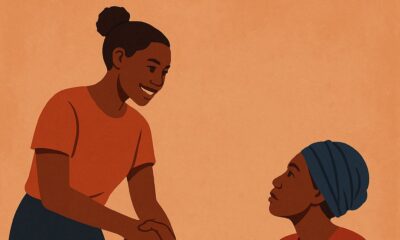Features
Mojisola Ogunlola: Who Stands In the Way of Our Justice?
I also remember the story of a certain pastor who had been raping a young female member of his church. Her parents were members of the church and they lived on the same street as the pastor. They would send gifts and food items to their revered spiritual leader through their teenage daughter who would be met by a shameless abuser. When she declared her intentions to stop attending the church, her parents delivered her from the evil spirit, prompting her to backslide through a good and memorable beating. The molestation only stopped when she went away to the university.
 Recently, my heart has been heavy, or perhaps what it is is broken – it’s sometimes difficult to tell the difference. I only know that I grieve and bleed for myself and women like me.
Recently, my heart has been heavy, or perhaps what it is is broken – it’s sometimes difficult to tell the difference. I only know that I grieve and bleed for myself and women like me.
I have been thinking a lot about life generally: love and evil, but mostly about rape. I have been thinking about the plight of my sisters, women who have been raised to tame their voices and live in perpetual denial of their own selves. I have been thinking about the evil we have done to them by teaching them to attune their lives to the unreal expectations of a largely apathetic society.
Reporting rape can be mentally and emotionally difficult, yet a lot of times when a victim musters some courage to speak on their situation, some “well-meaning” individuals are, more often than is necessary, swift to jump to the rescue by defending the already powerful tormentor.
What do you mean you were raped by that “respectable” man?
Don’t you know that you invited him into your body by that skimpy thing you were wearing?
If I may ask, what were you even doing out that late? You had better bury your head in the pool of your own shame and die! May our dear Lord protect these feeble ones who are tempted to rape others at every opportunity.
For a long time, I have wondered: When we will begin asking the truly relevant questions. As an undergraduate in my first year, I was privy to a certain incident that occurred in my University. A young lady had been gang-raped by a group of boys. Bruised and emotionally broken, she managed to report the case to the school authorities. She was asked a couple of irrelevant questions (such as those mentioned above), and though the matter escalated into a subject of public discourse, she got no justice – only shame.
I also remember the story of a certain pastor who had been raping a young female member of his church. Her parents were members of the church and they lived on the same street as the pastor. They would send gifts and food items to their revered spiritual leader through their teenage daughter who would be met by a shameless abuser. When she declared her intentions to stop attending the church, her parents delivered her from the evil spirit, prompting her to backslide through a good and memorable beating. The molestation only stopped when she went away to the university.
After the reported death of Elizabeth Ochanya, the alleged 13-year-old victim of a 5-year rape by her 52-year-old uncle (a lecturer in the Department of Catering and Hotel Management of the Benue State Polytechnic, Ugbokolo) and his son, I was thrown into deep thought. She battled with a few ailments reportedly originating from being regularly drugged, abused, molested and raped both anally and vaginally by father and son, after which she died of Vesicovaginal fistula (VVF) and other health complications at the Benue State University Teaching Hospital, Makurdi.
The much-deserved cry for justice rang loud through every corner of the country, as though Elizabeth was the first of her class. In the midst of the very potent justice movement, a good friend said to me, “This is not the first time we have experienced such an uproar concerning rape or other vices. It will only be a while before people forget.” As unwilling as I was to admit this, it was a profound statement in many ways.
I actively recalled many of the rape incidents I had heard in the past, some even by the same perpetrators. I remembered, also, that once upon a time, there existed a vibrant activism for the release of the Chibok girls and Leah Sharibu. It’s really not that we don’t care anymore; time only passes, life happens and we forget. Until it happens again.
I suspect that a major reason why there was such a response to Elizabeth’s case was because of her death. Reports state that she had been ill since January this year. I imagine that if she had recovered, by now, this may just be one of the thousands of other gory rape cases buried underneath flimsy apologies and contemptuous negotiations. Just a story of another damaged girl. Big deal?
I couldn’t stop thinking – Why couldn’t she speak up? Or run away. But then I thought again, Would her voice have been heard? Perhaps our problem is more of a cultural one, where we measure the uprightness of a child by her compliance and willingness to be subdued. I honestly don’t have all the answers. I’m not completely certain if the most effective means of erasing rapists from the face of the earth is severing their genitals (though I do not deny that this will be gratifying). I only know that we can begin to change the narrative if we considered it essential to listen a little more. If possible, more often than we speak or judge or blame. It’s important to listen to the stories of others and their own perspectives, even when it is convenient not to, even when it challenges our fundamental ideas on crucial issues, even when it is children who speak.
Enough of the victim blaming and selfish prayers that such evil never befalls our own loved ones. The fact that you have never been raped or abused, does not erase the legitimacy of a person’s claim. We can start by acknowledging the struggles of others and providing support in whatever ways we can.
The justice we earnestly seek is often hindered by our own weaknesses and denials – in the (mis)education of our children, in our idealism, and inability to show empathy for those we do not know.
If you know anyone who has been raped, please consider helping them get support from organizations like Mirabel Centre, who provide forensic medical assistance, and professional counseling services to rape and sexual assault victims.
Photo Credit: Dreamstime



















